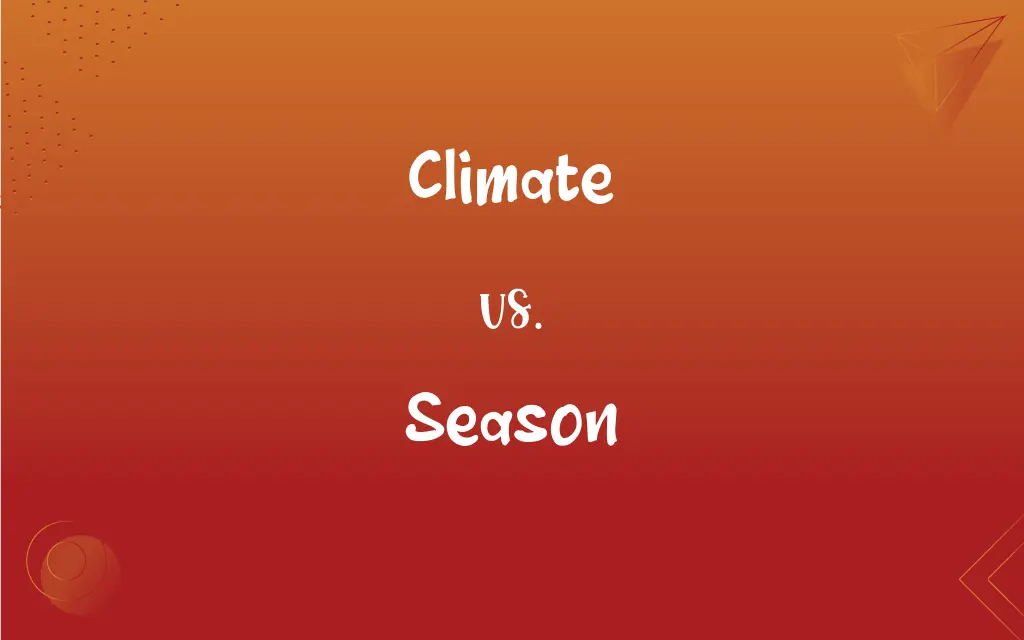Climate vs. Season: What's the Difference?
Edited by Janet White || By Harlon Moss || Published on December 2, 2023
Climate is the long-term pattern of weather in an area, while a season is a periodic change in weather due to Earth's tilt and orbit.

Key Differences
Climate describes the aggregate weather conditions of a region over long periods, often years. On the other hand, seasons are specific time periods characterized by particular weather patterns, recurring annually.
The climate of an area includes temperature, humidity, wind patterns, and precipitation trends. Seasons, however, such as spring or winter, bring distinct weather changes like warming temperatures or snowfall.
Climate can determine the general weather expectations of a region, like arid or tropical. Seasons influence activities and ecosystems, like planting in spring or hibernation in winter.
Climates can vary greatly across different regions of the world, shaping local environments. Seasons, while varying in intensity, generally occur worldwide in a predictable sequence.
Climate change refers to long-term shifts in climate patterns, often due to global factors. Seasonal changes are regular and expected shifts in weather as part of the Earth's natural cycle.
ADVERTISEMENT
Comparison Chart
Definition
Long-term weather patterns of a region.
Periodic changes in weather throughout the year.
Duration
Measured over years or decades.
Lasts a few months, typically three.
Impact
Affects overall environment and ecosystems.
Influences activities and natural processes.
Variability
Relatively stable over long periods.
Changes predictably throughout the year.
Global Influence
Influenced by global and regional factors.
Driven by Earth's tilt and orbit around the sun.
ADVERTISEMENT
Climate and Season Definitions
Climate
The long-term atmospheric conditions affecting an area.
The Arctic climate is characterized by prolonged cold temperatures.
Season
A division of the year marked by changes in weather, ecology, and daylight.
Autumn is the season when leaves change color and fall.
Climate
The average weather conditions in an area over a long period.
The climate in the Sahara Desert is extremely hot and dry.
Season
A period characterized by specific weather conditions.
The rainy season brings much-needed water to the region.
Climate
A broad categorization of weather based on typical conditions.
A tropical climate typically includes high humidity and heavy rainfall.
Season
One of the four periods of the year: spring, summer, autumn, or winter.
Winter is the season known for snow and cold temperatures.
Climate
A region's general weather patterns, including temperature and precipitation.
The Mediterranean climate is known for its dry summers and wet winters.
Season
A time of year distinguished by particular climatic features.
In spring, the season of renewal, flowers begin to bloom.
Climate
The overall meteorological conditions that define a region's environment.
The climate of the Amazon Rainforest is hot and humid year-round.
Season
A recurring phase in a year marked by certain weather patterns.
During the dry season, water sources become scarce in the savannah.
Climate
The meteorological conditions, including temperature, precipitation, and wind, that characteristically prevail in a particular region.
Season
One of the four natural divisions of the year, spring, summer, fall, and winter, in the North and South Temperate zones. Each season, beginning astronomically at an equinox or solstice, is characterized by specific meteorological or climatic conditions.
Climate
A region of the earth having particular meteorological conditions
Lives in a cold climate.
Season
The two divisions of the year, rainy and dry, in some tropical regions.
FAQs
Are seasons the same everywhere?
No, seasons vary in timing and characteristics across different regions.
Does climate change affect seasons?
Yes, climate change can alter the length and intensity of seasons.
Can a region’s climate be altered?
Over long periods, climate can change due to natural or human influences.
Why do some places have extreme seasons?
Extreme seasons are often due to a region's latitude or climatic conditions.
Does urbanization affect climate?
Urbanization can create microclimates with different weather patterns.
Do equatorial regions experience seasons?
Equatorial regions have less pronounced seasonal changes, often wet and dry seasons.
Are seasons the same in the Northern and Southern Hemispheres?
No, they are opposite; when it's summer in one, it's winter in the other.
Can climate influence a country's economy?
Yes, climate can impact sectors like agriculture, tourism, and energy.
Is climate related to global warming?
Yes, global warming is a significant factor in long-term climate change.
What causes seasonal changes?
Seasonal changes are caused by Earth's tilt and orbit around the sun.
How do animals adapt to seasons?
Animals adapt through migration, hibernation, and changes in behavior.
How do seasons affect traditional festivals?
Many festivals are tied to specific seasons, celebrating their unique aspects.
Can seasons affect mood?
Yes, seasonal changes can influence mood and behavior, like Seasonal Affective Disorder.
How does climate affect agriculture?
Climate determines the types of crops that can grow in a region.
What is a monsoon season?
A monsoon season is characterized by heavy rain, primarily in South Asia.
Can climate impact health?
Yes, climate can affect health through factors like heat waves or cold snaps.
Are climate zones fixed?
Climate zones can shift over time due to natural and anthropogenic factors.
Is climate the same as weather?
No, climate refers to long-term trends, while weather is short-term.
Why do some places have only two seasons?
Some regions, especially near the equator, typically have wet and dry seasons.
Does climate include extreme weather events?
Climate encompasses the frequency and intensity of extreme weather over time.
About Author
Written by
Harlon MossHarlon is a seasoned quality moderator and accomplished content writer for Difference Wiki. An alumnus of the prestigious University of California, he earned his degree in Computer Science. Leveraging his academic background, Harlon brings a meticulous and informed perspective to his work, ensuring content accuracy and excellence.
Edited by
Janet WhiteJanet White has been an esteemed writer and blogger for Difference Wiki. Holding a Master's degree in Science and Medical Journalism from the prestigious Boston University, she has consistently demonstrated her expertise and passion for her field. When she's not immersed in her work, Janet relishes her time exercising, delving into a good book, and cherishing moments with friends and family.






































































